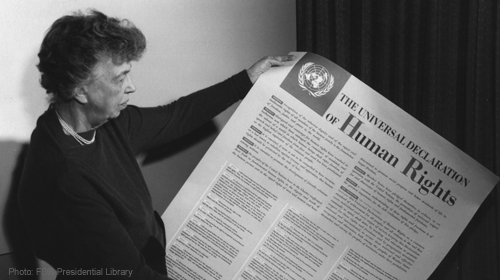
Henry Hill was 16 when he was charged for his involvement in a shooting that took place in a Michigan park. He is now 48 and has spent two-thirds of his life in a prison cell. Although in recent years the has struck down some laws that allow children to be committed to die in prison, the United States remains the last country in the world where children can still be sentenced to serve life without the possibility of parole. While the U.S. has historically provided global leadership on some human rights issues, Henry Hill serves as a grave reminder that we're still out of step with rest of the world on many of the most fundamental human rights protections.
Sixty-three years ago today, the United Nations General Assembly proclaimed December 10 . It celebrates the birthday of the , the foundational document expressing our collective will to advance human rights and "strive by progressive measures, national and international, to secure their universal and effective recognition and observance."
This year also marks the of the establishment of the , the principal outcome of the landmark international conference on human rights which took place in Vienna in 1993.
The United States' track record in some of what the calls the most basic of rightsãthe right to life, right to vote, freedom from torture, and economic rights, among othersãis greatly in need of improvement. We often don't practice what we preach. Just last week, at the annual summit hosted by Human Rights First, National Security Advisor Susan Rice publicly criticized the Iranian government for not allowing the to visit the country. The U.S., however, lacks credible leverage to change this policy when it continues to deny U.N. human rights experts unimpeded access to the prison at GuantûÀnamo Bay.
In commemoration of this year's Human Rights Day, we're releasing a new fact sheet that provides a critical snapshot of 12 human rights issues the United States is failing to adequately address, including some astounding statistics on persons deprived of their liberty. In 2012, the number of people held in immigration detention reached 410,000 people, an increase of more than 400 percent since 1996. Fueled by over-incarceration policies and discrimination, the incarceration rate in the United States is still the highest in the world. Other issues addressed in our fact sheet include:
- Women's Rights
- Criminal Justice (more specifically, capital punishment, life without parole for children)
- Voting Rights
- LGBT Rights
- Rights of Persons with Disabilities
- Socioeconomic Rights
- Racial Profiling
- Children's Rights
- Accountability for Torture
In addition to the areas addressed in the fact sheet, the United States also continues to set a poor example for other countries when it comes to mass surveillance, targeted killings, and more.
As our fact sheet explains:
Without doubt the U.S. continues to provide global leadership on some human rights issues. For example, the current administration provided vigorous leadership in fighting for LGBT equality, combating trafficking, and championing religious freedom and peaceful assembly rights. But while some U.S. laws and policies have been comparatively advanced in protecting civil rights and civil liberties, the U.S. has fallen behind in protecting the universal human rights recognized by the UDHR. Our government has only partially and selectively embraced these rights, ignoring international obligations and widening the gap between the United States' sixty-five-year-old promise and its own current practice.
As we celebrate Human Rights Day, we cannot forget urgent and ongoing domestic human rights violations, like mass incarceration and juvenile life without parole. For people like Henry Hill, who has spent half of the 's history behind bars, paying our respects to human rights once a year won't get him home.
Learn more about human rights and other civil liberty issues: Sign up for breaking news alerts, , and .

